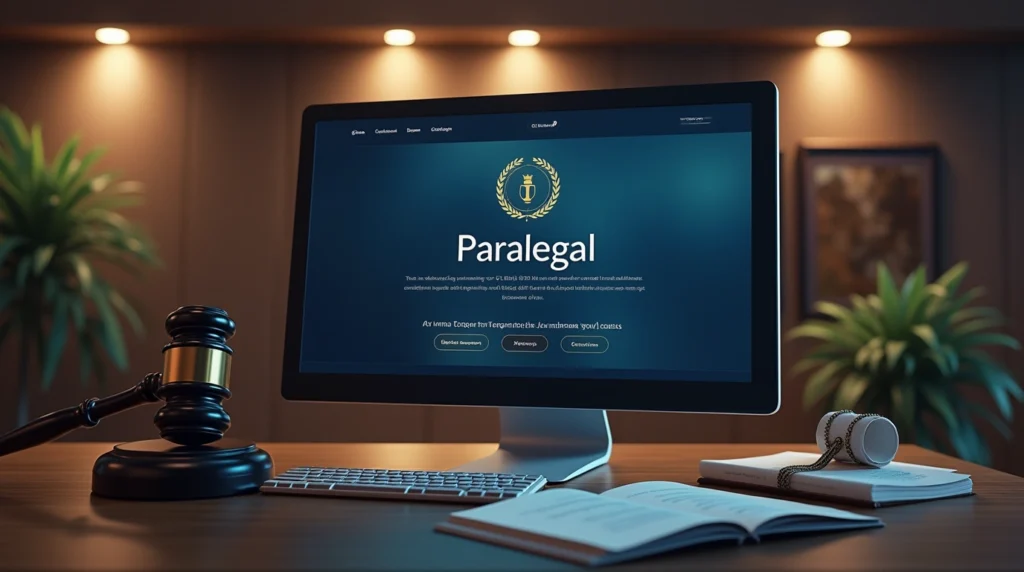Let’s talk about becoming a paralegal in 2025. The legal world’s shifting—law firms are leaner, corporations are hungrier for support, and skilled paralegals are stepping into the gap. I’ve been around this field long enough to see the demand creep up, and the numbers back it: the Bureau of Labor Statistics pegs job growth at 4% through 2032, though some programs claim it’s closer to 14%.
Either way, it’s steady work, with median pay hovering around $60,000—more if you land in a hot market like San Francisco or Seattle. But here’s the kicker: you don’t need a law degree to get there. Online paralegal programs are making it easier than ever to break in, whether you’re juggling a job, kids, or just life in general.
I’ve dug through the options—piles of program websites, grad reviews, employer chatter—and narrowed it down to five that stand out for 2025. These aren’t just random picks; they’re the ones that balance quality, cost, and real-world prep. Some have the American Bar Association’s stamp, others don’t but still deliver. I’ll walk you through each, break down what matters when choosing, and toss in some hard-earned tips. This isn’t a sales pitch—it’s a roadmap.
Table of Contents
Why Choose an Online Paralegal Programs?

One of the primary benefits of online paralegal education is the flexibility it offers. Students can design their learning schedule around their existing commitments, making it easier to balance education with work, family, or other responsibilities. This level of convenience is particularly valuable for those who cannot relocate or attend classes during traditional hours. The ability to study from anywhere eliminates geographical barriers, giving students access to programs offered by some of the best institutions, regardless of their location.
Affordability is another key advantage. Online programs often have lower tuition costs compared to on-campus options. Additionally, students can save on expenses such as transportation, housing, and other campus-related fees. Many programs also provide financial aid, scholarships, and flexible payment plans, making them accessible to a broader range of learners.
Reputable institutions are increasingly offering online paralegal programs, some of which are approved by the American Bar Association (ABA) or regionally accredited. These programs adhere to rigorous academic standards, ensuring that students receive a quality education that employers recognize and value. Enrolling in a program affiliated with a respected university can also provide access to a wide range of resources, including digital libraries, career counseling, and networking opportunities.
Career advancement is a significant motivator for many students choosing online paralegal education. These programs often include specialized coursework in fields such as corporate law, family law, or intellectual property, allowing students to tailor their education to specific interests or career goals. Graduates are equipped with practical skills in legal research, writing, and technology, all of which are essential in today’s legal environment. Furthermore, many programs prepare students for certification exams, enhancing their employability and credibility in the job market.
For those seeking quick career transitions, certificate programs can often be completed in a matter of months, making it possible to enter the workforce rapidly. On the other hand, associate’s and bachelor’s degree programs provide a more comprehensive education for individuals planning long-term growth or leadership roles in the legal profession.
What to Look For: Picking the Right Online Paralegal Programs
Before we hit the top five, let’s get real about what makes a program solid. I’ve hired paralegals, trained them, watched them flounder or soar—here’s what I’d tell you to check:
- Accreditation: ABA approval is gold, but not a must. Regional accreditation (think DEAC) works too. It’s about credibility—employers notice.
- Curriculum: Legal research, writing, ethics—the basics. Bonus if they offer specialties like family law or corporate gigs.
- Flexibility: Self-paced or live classes? Pick what fits your chaos. Asynchronous is king for night owls.
- Teachers: Paralegals or attorneys with real cases under their belts beat pure academics every time.
- Tech: If they’re not teaching Westlaw or LexisNexis, run. Modern firms expect you to know this stuff.
- Support: Career help, internships, networking—crucial for landing that first job.
- Cost: Weigh it against outcomes. A $10,000 program with 90% placement beats a $5,000 one with nada.
The Top 5 Online Paralegal Programs in 2025

1. Georgetown University – Certificate in Paralegal Studies
Georgetown’s a heavyweight, and their online certificate lives up to the name. It’s ABA-approved, which means it’s built to tough standards—think deep dives into legal research, writing, and case prep. They’ve been at this since ’98, tweaking it yearly with input from D.C. attorneys who know the game. You’ll draft motions, study tech like e-discovery, even snag virtual internships with government offices or firms. It’s not cheap—$9,950 all-in—but 89% of grads land jobs within three months. That’s serious bang for your buck.
The catch? You need a bachelor’s to get in, and it’s intense—6 months if you push, 12 if you pace it. Perfect if you’re career-switching with some education already and want prestige on your resume. Less so if you’re starting from scratch or strapped for cash.
2. UC San Diego Extension – Paralegal Program
UC San Diego’s a sleeper hit. At $7,995, it’s more affordable than Georgetown, but don’t sleep on the quality—ABA-approved, taught by J.D.s who still practice. They lean into California law, which is great if you’re West Coast-bound, but the skills translate anywhere. You get virtual library access, career coaching, and a 92% job placement rate that’s hard to argue with. Takes a year, 15-20 hours a week, with evening options for workers.
Downside? It’s a commitment—those hours add up if you’re juggling a lot. Still, for the price and outcomes, it’s a practical pick for anyone wanting a solid start without breaking the bank.
3. Boston University – Online Paralegal Studies Program
Boston University’s newer to the scene but climbing fast. Why? They bake tech into everything—legal analytics, database management, e-discovery. You’re not just learning law; you’re learning the tools firms crave. Grads say it’s why they snag starting salaries 12% above average—think $65,000-$70,000 out the gate. It’s flexible too: 14 weeks flat-out or 7 months steady, all asynchronous. Tuition’s $8,500, with scholarships if you qualify.
It moves quick, though—blink and you’re behind. If you’re tech-savvy and want a modern edge, this one’s a no-brainer. Less ideal if you need hand-holding or prefer a slower burn.
4. Duke University – Paralegal Certificate Program
Duke’s program is a sprint—12 weeks, full immersion, like a legal bootcamp. Small groups (25 max), personal advisors, and a focus on North Carolina law with national chops. You’ll collaborate like a real legal team, tapping Duke’s law school network for connections. Costs $8,995, and it’s intense—25-30 hours a week. But for career-changers needing speed and credibility, it’s gold. Nearly all grads land gigs fast, thanks to that alumni reach.
Not for the faint-hearted or time-strapped. If you can handle the pace, though, it’s a rocket to the field.
5. University of Washington – Certificate in Paralegal Studies
UW’s the wildcard—flexible, affordable ($6,995), and hands-on. You build your own path after the core, picking from 12 specialties like data privacy or corporate law. The kicker? A guaranteed 150-hour virtual internship. Real cases, real attorneys, real references. Takes 6-18 months, depending on you, with quarterly networking in Seattle’s legal scene. It’s not ABA-approved, but the practical edge makes up for it.
Some say it lacks structure—self-starters thrive, dawdlers drift. For budget-conscious folks who want experience over flash, it’s a steal.
Navigating Your Choice

Five programs, five vibes. Georgetown’s your prestige play—pricey but connected. UC San Diego’s the value champ—steady and reliable. Boston’s for tech heads chasing higher pay. Duke’s the fast lane—intense but effective. UW’s the custom fit—cheap and practical.
So, how do you pick? Ask yourself: What’s my budget? How much time can I give? Do I need ABA approval where I’ll work? Am I after a quick certificate or a deeper degree? Check local job ads—some firms demand ABA, others just want skills. If you’re in a tech hub, Boston or UC Berkeley (another contender) might edge out. Rural? Flexibility like UW or Penn Foster shines.
The job market’s solid—38,000 openings yearly, $60,000 median, more in cities like San José ($81,510). Certification (like NALA’s CP) boosts you further. These programs can get you there, but it’s on you to grind.
Tips to Thrive in an Online Paralegal Program
I’ve seen students ace this and others crash. Here’s what works:
- Time: Block it out—10 hours a week minimum, more for fast tracks. Use a calendar app; don’t wing it.
- Resources: Milk the libraries, tutors, forums. They’re there for a reason.
- Network: Join NALA or local groups. Jobs come from who you know.
- Practice: Mock briefs, research drills—do it before the boss asks.
Conclusion
Online paralegal programs aren’t just a shortcut—they’re a lifeline to a career that’s challenging, stable, and pays decently. The five here? They’re the best I’ve sifted out for 2025—each with quirks, each with strengths. Dig into their sites, crunch your numbers, and pick what fits your life. The legal world’s waiting, and it’s not as far off as you think.
FAQ
Are online paralegal programs legit for employers?
Yes, if accredited—ABA-approved ones like Georgetown carry extra weight, but solid outcomes matter more.
How much do online paralegal programs cost?
Between $6,995 (UW) and $9,950 (Georgetown)—certificates mostly, degrees run higher.
How long are online paralegal programs?
Certificates range from 12 weeks (Duke) to 18 months (UW); degrees take 2+ years.

